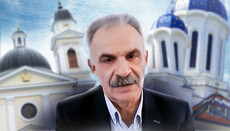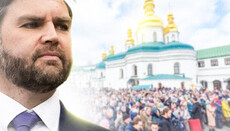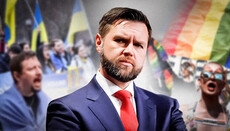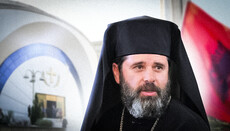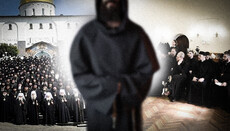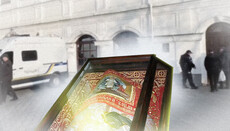Who the authorities fight in the person of the Ukrainian Orthodox Church

If the UOC were separated from the Russian Orthodox Church, this would not change the attitude of the authorities and other enemies of the Church to it.
Looking at the events around the Ukrainian Orthodox Church, many wonder: why shouldn't the UOC episcopate join in full the project of an independent autocephalous Church, which the secular authorities want to realize? Indeed, in this case, all problems are solved: all claims to the UOC disappear, persecution ceases, anti-church laws are not passed, temples are not seized, the clergy are not defamed in the media, etc. Why is the UOC so persistent?
OSU for "Moscow priests"
The main complaint with the UOC on behalf of the Ukrainian authorities, pseudo-patriotic public figures and media hostile to the Church is its connection with the “Russian world”, Russia, Moscow, the FSB, the Kremlin and Putin personally. There are rumours and allegations that going around that the UOC receives instructions from a neighboring state and, according to these instructions, undermines the independence of Ukraine; that the UOC serves Russia; that all priests, or at least the bishops, are Kremlin agents, “Moscow cassocks”, etc.
But in fact, those who voice them do not believe in the truth of these preposterous accusations. It is very easy to prove it. Imagine that all 92 bishops of the UOC are really agents of the Kremlin, the “fifth column” of Moscow. Then why did the head of Ukraine, Petro Poroshenko, invite them all to join the Orthodox Church of Ukraine? Indeed, in this case, the episcopate of the UOC would have a majority at the “Unification Council” held on December 15. Metropolitan Onufry could have headed the OSU, and the UOC bishops would have occupied most of the leading posts.
"Kremlin agents", "Moscow priests" would have taken over the power in the OCU. This would have been one of the most successful operations of the FSB of Russia! And the Kremlin would now govern the unified Church of the State of Ukraine. Why did the "Kremlin agents" refuse this? Simply because they are not Kremlin agents. And both the President and the Speaker of the Parliament Andrei Paruby, and all other persecutors of the UOC understand this perfectly well.
But it turns out that in the person of the Ukrainian Orthodox Church, the Ukrainian authorities are fighting not with the “aggressor state”. Then who with?
Maidan, Europe, and Uniates
To answer this question, you have to look at the history of Ukraine. “History is a flashlight into the future that shines from the past.” This is true, even though it was said by the Russian historian V.O. Klyuchevsky.
But first, let us pay our attention to three points that make up the realities of today's Ukrainian life.
1. Ukraine is integrating into Europe.
2. The influence of Greek Catholics, including (or above all) those in power, is growing in Ukraine.
3. The government declared the Orthodox Church a structure of the “aggressor state”.
There is no need to prove the first thesis. The course for European integration is fixed at the legislative level, and the President and other politicians never stop reminding the population of this.
The second statement was voiced by the head of the UGCC Sviatoslav Shevchuk himself: “The Ukrainian Greek Catholic Church is now powerfully developing. We have not seen such a rapid development of our Church over the past five years, perhaps, since the time of the UGCC’s coming out of hiding in the early 1990s. Now, perhaps, there is not a single large city in Ukraine where the UGCC would not be built.” Shevchuk said these words during his recent visit to the United States.
You can have different attitudes to Euromaidan and what it brought Ukraine, but it cannot be denied that the UGCC was one of the main forces of the Maidan, and in terms of ideology it is definitely the main one. As you know, the Kiev Maidan began with the call of the journalist Mustafa Nayem to come out and speculate that the then President of Ukraine Viktor Yanukovych decided to postpone the signing of an association agreement with the European Union.
But a year before that, Nayem had been closely associated with the Ukrainian Catholic University (UCU). On the official website of the UCU, he was listed as "an expert of the UCU Master's Program in Journalism". And on the very first evening, several more UCU employees came to Maidan to “speculate”.
And soon "maidan" appeared in Lvov, from where young people were purposefully sent to Kiev. And Lvov "maidan" was organized by the UCU students. And the head of the UCU, the Greek Catholic Bishop Boris Gudziak, organized support for the Maidan abroad. The Uniate communities organized most of the rallies of support right from the doors of their temples.
At the same time, Gudziak said that half of all the protesters on the Maidan of Kiev are parishioners of the Greek Catholic Church. And on December 8, the ex-head of the UGCC Lubomir Guzar, speaking on the Maidan, called on the protesters to "win changes themselves". Following this call, on the same day, a march against the government quarter was proclaimed on Maidan. Everyone knows how it ended.
"There is not a single large city in Ukraine where the UGCC would not be built."
Sviatoslav Shevchuk
After the Maidan, in the corridors of the Ukrainian authorities, there turned out to be a lot of Uniates, who began to determine the home and foreign policy of the state. And in 2015, UCU Professor Yaroslav Gritsak identified the main enemy, with whom one can and must fight, using the presented historical chance. This enemy was neither Russia, nor the Kremlin, and nor Putin. The enemy turned out to be ... the Byzantine-Orthodox heritage.
In the journal "Novoye Vremia" ("New Time"), Gritsak published an article in which he first referred to his colleague: “The late Harvard professor Igor Shevchenko warned in the early 1990s: “It is relatively easy to overcome the Soviet past, but what about the Byzantine-Orthodox heritage?” And then he said that to overcome this Byzantine-Orthodox heritage, the crisis that Ukraine is experiencing today was necessary: "To radically overcome history, we need a large-scale crisis. For example, such as it was at the time of the fall of communism. Or such as the one we are experiencing now."
The third thesis, the declaration of the Ukrainian Orthodox Church as the structure of the “aggressor state”, as well as the first one, does not need to be confirmed. The President does not fail to mention it practically in each speech, as well as to say that this structure, i.e. UOC, has no place in Ukraine.
From the history of the Ukrainian "bydło"
And now let us remember when the three factors mentioned above already converged in the history of Ukraine: integration into Europe, the Uniates in power, and the accusation of the Orthodox of their work for the “aggressor state”?
XVII century. Ukraine is not just on its way to Europe, it is part of Europe, is part of the Polish-Lithuanian Commonwealth (Rzeczpospolita). In fact, it was viewed as a poor stepdaughter. Ukrainians — both peasants and noblemen — were considered second-rate people. The Poles pursued a policy of polonizing and catholicizing the population of our country.
The peasants suffered under the yoke of serfdom, which was introduced in the Grand Duchy of Lithuania in 1447 according to Priviley (Privilege) of Grand Duke Casimir and finally consolidated in 1588 in the Third Lithuanian Statute. French historian Daniel Beauvois wrote about the serfdom in the Polish-Lithuanian Commonwealth the following: “The Lithuanian Statute, which originated in the XVI century, was extremely cruel, allowed treating peasants as slaves, as the livestock." According to D. Beauvois, the Polish gentry believed that Ukrainian peasants had no soul.
And the Polish law of 1590 declared the territory to the south and southeast of Belaya Tserkov, i.e. most of Ukraine, a "desert" and gave the king the right to allocate these lands along with the population to the Polish magnates and gentry. “The life and property of the peasant were in full possession of the feudal lord. The Frenchman Beauplan, who lived in Ukraine for 17 years, noted that the peasants there were extremely poor, they were forced to give their lord everything he wanted; their position was worse than that of galley slaves. The polish gentry and magnates called the Ukrainian peasants ‘bydło’, i.e. brutes (cattle). For the slightest disobedience, the peasant could be subjected to severe torture. Some were ordered to be hanged and impaled” (World History. Encyclopedia. Vol. 5).
"For the slightest disobedience, the peasant could be subjected to severe torture. Some were ordered to be hanged and impaled."
As for the Ukrainian nobility, we give evidence of the Canadian historian of Ukrainian origin Orest Subtelny: “The Ukrainian nobility was faced with a difficult choice. On the one hand, there was the native, but depleted soil of the spiritual tradition, the Ukrainian culture, which is almost devoid of the possibility of normal development. On the other hand, it was an outwardly attractive, overflowing cultural life of Catholic Poland. Is it any wonder that the vast majority of Ukrainian nobles made their choice in favour of Catholicism and Polonization, which did not take long to wait? And this loss of the natural elite was of epochal significance for the whole subsequent history of Ukraine.”
That is, the Ukrainian gentry, in their desire to be involved in power and privileges in the Polish-Lithuanian Commonwealth, did not hesitate to betray Orthodoxy. And the Brest Union of 1596 provided an opportunity to do this while preserving the external similarity of the Orthodox faith.
The very betrayal of Orthodoxy in 1596 was motivated by political reasons, lust for power, ambition, thirst for money, honor, and privileges. That is the very same thing that motivates today the betrayal of the Ukrainian Orthodox Church and joining the OCU. There has been no talk of any religious motives either then or now.
This is how Subtelny describes the Brest Union. "In 1590, the Orthodox Bishop of Lvov, Gedeon Balaban, who was driven into a rage by ongoing clashes with brotherhood, and most of all – by tactless, in his opinion, interference with these "domestic quarrels" of the Patriarch of Constantinople, raised the issue of the union with Rome at a secret congress of Orthodox bishops in Bełz. There were three more bishops who agreed with Balaban. <...> These three bishops were Kiril Terletski from Lutsk, Dionysius Zbirujski from Chełm and Leonti Pelchitski from Turov. Later, Ipatii Potii of Volodymyr joined the conspirators – an adventurіst of noble descent, only recently ordained as an Orthodox priest, and before that he had been a Calvinist. It was he and Terletski who led the conspiracy of the bishops. <...> They declared to their flock that, having become part of the Catholic Church, it would finally receive the rights equal to those in Rzeczpospolita: no one will offend the burghers in their cities, and the nobles will not be left behind in advantageous places. And the career of the bishops themselves would sharply take off: in the case of their equal rights with the Catholic hierarchs, they received seats in the Senate and could actually influence not only church but also government affairs. Inspired by such a bright prospect, the conspirators held in strict confidentiality a series of negotiations with royal officials, Catholic bishops and Papal Nuncio. Finally, in June 1595, four Orthodox bishops officially announced their consent to lead their Church to union with Rome. They pledged to unconditionally recognize the authority of the Pope in all matters of faith and dogma – in return for guarantees of the preservation of traditional Orthodox liturgy and church rites, as well as traditional rights of priests, such as the right to have a family. And at the end of 1595, Terletski and Potii went to Rome, where Pope Clement VIII proclaimed the official recognition of the union.”
Agents, whose are you?
How similar it is to the description of today's Ukrainian situation: the same secret negotiations between Poroshenko and Patriarch Bartholomew, the same careerism, the same concealment of their true intentions from the flock, the same unconditional (and unlawful) recognition of Phanar’s authority over Ukraine.
After the union with Rome was concluded, the Uniate bishops received representation in the Polish Sejm, the gentry – wide access to power while persecution fell upon the Orthodox.
And now let’s pay attention to the fact that in the XVII century Rzeczpospolita fought almost continuous wars with the Ottoman Empire. Historiography has as many as five major conflicts, which are called "wars", but in addition there were many local conflicts and clashes that occurred almost every year. These wars occurred either directly between Poland and Turkey or were part of more global conflicts. For example, the First Polish-Turkish War (1620-1621) was part of the Thirty Years’ War (1618-1648), and the Fifth Polish-Turkish War (1683-1699) was part of the Great Turkish War (1683-1699). In any case, in the 17th century, the Polish-Lithuanian Commonwealth and the Ottoman Empire were geopolitical opponents.
And now the rhetorical question: whose agents were the Orthodox considered in Rzeczpospolita if the Kiev Metropolis was then part of the Constantinople Patriarchate? And the Phanar itself was very deeply and, moreover, officially integrated into the state apparatus of the Ottoman Empire.
But we know that the Union of Brest, like all historical unions, enclosed by individual Orthodox hierarchs or even Local Churches with Rome, was aimed at the destruction of the Orthodox Church as such. Therefore, now it is necessary to understand that in Ukraine there is a struggle with the Church of Christ, rather than the mythical influence of Russia through it. They want to destroy the Church as such. And if our bishops chose a policy of conciliation and compromise, it would only expedite its destruction. But, thank God, either the Primate, His Beatitude Onufry, or the hierarchs, or the clergy, or all the believers do not try to buy a quiet life for themselves through betrayal but firmly stand in faith and truth.
About the heavenly and the earthly
We need to understand that if the UOC itself were now separated from the Russian Orthodox Church, this would not change the attitude of the secular authorities, national radicals and all the other enemies of the Church to it in any way. They would simply find other charges against it.
We need to understand: to avoid persecution by the state in today's conditions, the UOC must cease to be the Church of Christ and become a political and social institution that responds to the demands of society and shares "European values". This is the price to pay for a quiet life. And the "Russian world" has nothing to do with it. In the person of the Ukrainian Orthodox Church, the authorities are fighting the Church. This was the case in the XVII century, the same is happening now.
Pay attention to today's Uniates. We have already mentioned above the unprecedented growth of the UGCC’s influence in Ukraine, announced by its head Sviatoslav Shevchuk. And after the "Unification Council" held on December 15, he was one of the first to express joy at the unification of the schismatics and the election of Epiphany Dumenko as head of the OCU. In his welcoming address, Shevchuk clearly and unequivocally expressed the hope that his structure would take over the newly formed OCU: "At this historic moment, I want to extend a brotherly hand on behalf of our Church to the newly elected primate and all Orthodox brothers, saying that from now on we go together in history, in unity, in truth. Because the future of the Church, the people, and the Ukrainian free, independent, European state depends on how much we cherish unity and overcome what separates us." Shevchuk also mentioned that this event is considered "God's gift" on the way to the "complete unity of the Churches of Vladimir’s Baptism".
History repeats itself. The Church survived in the persecutions by the pagans in the first three centuries of Christianity, withstood the persecutions by the Uniates in the Polish-Lithuanian Commonwealth, in the USSR – the persecutions by the communists, it will endure now. We must only remain faithful to it and not change the heavenly to the earthly.
